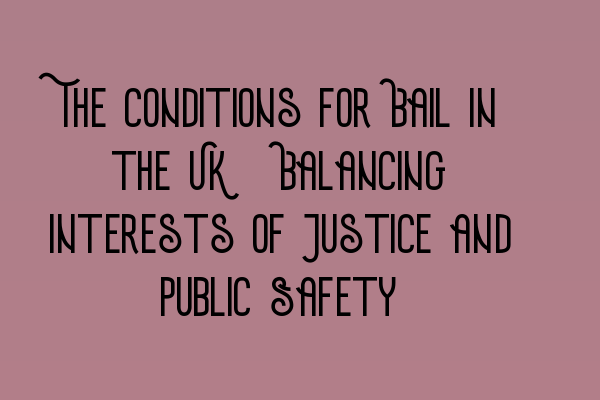The Conditions for Bail in the UK: Balancing Interests of Justice and Public Safety
When it comes to the criminal justice system, one of the key considerations is the proper balance between the interests of justice and public safety. This delicate equilibrium is particularly evident when dealing with the question of bail. Bail is a system that allows individuals accused of a crime to be released from custody while awaiting trial, provided certain conditions are met. In the United Kingdom, the conditions for bail are carefully determined in order to protect the rights of the accused and maintain public safety.
What is Bail?
Bail refers to the release of an individual charged with a criminal offense from custody while they wait for their trial to take place. The purpose of bail is to ensure that defendants can maintain their freedom and continue their daily lives, as long as they meet specific conditions set by the court. By granting bail, the court recognizes the presumption of innocence until proven guilty and allows the accused an opportunity to prepare their case.
The Interests of Justice
The interests of justice play a pivotal role in determining whether an individual should be granted bail. The court must weigh the need to ensure a fair trial against the potential risks associated with releasing a defendant. The primary consideration is preventing the accused from interfering with the administration of justice. Factors such as the seriousness of the offense, the strength of the prosecution’s case, and the defendant’s criminal history are all taken into account.
Related Articles: For further guidance on the SQE 1 examination, practice exam questions are available here. Additionally, take advantage of the SQE 1 practice mocks FLK1 and FLK2 here to enhance your preparation.
Public Safety Considerations
While the interests of justice are paramount, the protection of public safety cannot be overlooked. The court must carefully assess the risk of a defendant reoffending or posing a danger to the community if released on bail. In cases involving serious offenses or a significant likelihood of reoffending, the court may impose restrictive conditions or deny bail altogether.
To balance the interests of justice and public safety, certain conditions may be imposed on the individual seeking bail. These conditions can range from reporting to a police station regularly, surrendering travel documents, or even electronic monitoring. The aim is to mitigate the risk to the public while ensuring fairness to the accused.
Related Article: For comprehensive SQE 2 preparation, consider enrolling in our SQE 2 preparation courses here.
Reasons for Denial of Bail
There are situations where bail may be denied altogether. This typically occurs when the court believes there is a high risk of flight, a strong likelihood of interference with witnesses, or a potential threat to the safety of witnesses or the community. In such cases, the accused may be remanded in custody until their trial.
Related Article: Stay informed about the upcoming SRA SQE exam dates by visiting our website here.
Breach of Bail Conditions
When an individual is granted bail, it is essential that they comply with the specified conditions. Failure to do so can result in serious consequences, including the revocation of bail and the individual being taken back into custody. It is crucial for defendants to understand the terms of their bail and ensure they adhere to them to avoid facing additional legal trouble.
In conclusion, the conditions for bail in the UK seek to strike a balance between the interests of justice and public safety. While granting bail acknowledges the presumption of innocence, it also acknowledges the need to protect the public from potential harm. By carefully considering factors such as the seriousness of the offense and the likelihood of reoffending, the court can make informed decisions regarding bail. It is crucial for individuals involved in the criminal justice system to understand the importance of complying with bail conditions to safeguard their freedom while awaiting trial.
For more information on preparing for your SQE 1 exams, check out our SQE 1 preparation courses here.
Disclaimer: The information provided in this article is for general informational purposes only and does not constitute legal advice. For assistance with your specific legal situation, please consult a qualified solicitor.
